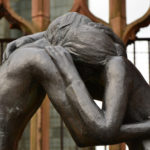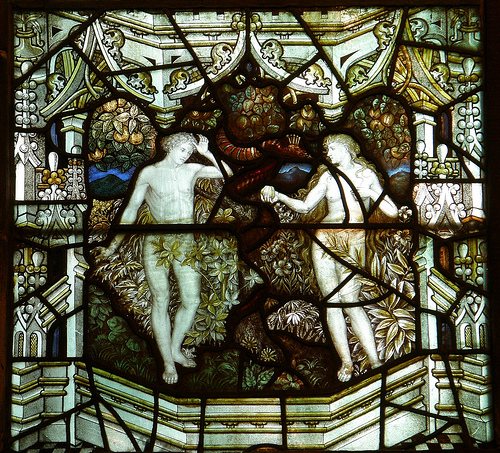We run our website the way we wished the whole internet worked: we provide high quality original content with no ads. We are funded solely by your direct support. Please consider supporting this project.
Judgment and Idolatry
Why was the forbidden tree in the center of the garden called The Tree of the Knowledge of Good and Evil? Since the Bible depicts eating from this tree as the reason humans are estranged from God and the cause of all that’s wrong with humanity, eating from this tree is obviously a terrible thing. But what’s so terrible about acquiring “knowledge of good and evil?” Why wouldn’t God want Adam and Eve to possess this knowledge?
The Hebrew concept of “knowledge” used here goes much deeper than mere intellectual knowledge. Rather, the concept of “the knowledge of good and evil” connotes an attempt by humans to define and experience good and evil on their own—apart from God. Eating from this tree represents a rebellion against God, for we are aspiring to be “wise like God” in the sense of grasping for moral autonomy—an exercise of sovereignty that is appropriate to God alone.
This is exactly what the serpent tempted Eve with. “[W]hen you eat of it,” he said, “your eyes will be opened, and you will be like God, knowing good and evil” (Gen 3:5). Eating from the forbidden tree represents our rebellious attempts to position ourselves as judges rather than leaving all judgment to God, as the bible consistently commands (e.g. Rom 14:10; James 4:11-12).
By eating from the forbidden tree, Eve was guilty of idolatry. Accepting the serpent’s false and untrustworthy depiction of God, Eve stopped trusting God to be her source of life and instead turned to the forbidden tree as a new source of life. This is idolatry.
Such idolatry causes us to define and experience as “good” all that gives us a sense of life. Conversely, everything that threatens our idolatrous sources of life is instinctively defined and experienced as “evil.” In other words, our idolatrous hunger unconsciously creates its own version of the Tree of the Knowledge of Good and Evil. We habitually see and experience the entire world through a filter of our self-serving judgments of good and evil.
The love that reflects the reign of God ascribes worth to others, at cost to oneself. In direct opposition to this, the judgment that reflects rebellion against God ascribes worth to oneself, at cost to others, and in rebellion against God’s own determination. Judgment, in other words, is the direct antithesis of agape love.
Put simply: We can’t possibly ascribe unsurpassable worth to others at cost to ourselves, while at the same time detracting worth from others to ascribe worth to ourselves.
Judgment is the antithesis of the kind of love that God always intended humans to receive and express to one another. It’s the antithesis of the kind of love that expresses God’s life and therefore the life of the kingdom.
I’m convinced this is why the Bible teaches that the Tree of the Knowledge of Good and Evil was placed in the center of the garden with the Tree of Life. Life as God intends it revolves around trusting God for his provision while obediently honoring God’s prohibition. This means we are to trust God’s provision of life while honoring God’s prohibition against judgment. And we cannot trust God’s provision of life while we participate in judgment.
The forbidden tree wasn’t some arbitrary test God put in the garden to tempt Adam and Eve. We should rather think of it as a sort of “No Trespassing” sign God lovingly gave to his first children. God was, in effect, teaching them—and us as well—that for life to be lived the way he intended it, for our life to manifest the beautiful kingdom of God, we must never think we can define and experience good and evil apart from him. When we try to do this, we are no longer trusting him for life and we immediately lose our capacity to receive his life and thus love like he loves.
The moment we become judgers, we stop being lovers. The moment we eat from the forbidden tree, we’re blocked from access to the Tree of Life (Gen 3:22-24).
Category: General
Tags: Adam and Eve, Idolatry, Judgment, Love, Tree of the Knowledge of Good and Evil
Topics: Following Jesus
Related Reading

The Cruciform Center Part 2: How John’s Gospel Reveals a Cruciform God
In the previous post, we looked at how the Synoptics illustrate the centrality of the cross. While the Gospel of John varies in its structure and language from the Synoptics, the cross remains at the center. This centrality is expressed in a number of different ways. 1. The role that Jesus’ death plays in glorifying…

The Coming Kingdom & Racial Conflict
In the book of Revelation, we see a glimpse into the future. John says he saw, …a great multitude that no one could count, from every nation, tribe, people and language, standing before the throne and in front of the Lamb. They were wearing white robes and were holding palm branches in their hands. And…

Greg and Bruxy Pulpit Swap
Greg Boyd and Bruxy Cavey swapped pulpits last weekend. Here are a couple of clips to give you an idea of what each of them offered. You can access the full sermons here and here.

Sermon Clip: Love: It’s All About the Cross
In this sermon clip, Greg Boyd talks about how Colossians 3:14 and the definition of love. God designed creation so that we would live in community with God and express God’s love towards each other and creation. However, sin disconnected us from God. In this sermon, Greg shows how we were created in the image…

The Greatest Mystery of the Christian Faith
God has always been willing to stoop to accommodate the fallen state of his covenant people in order to remain in a transforming relationship with them and in order to continue to further his sovereign purposes through them. Out of love for humankind, Scripture tells us, Jesus emptied himself of his divine prerogatives, set aside…

Loving Enemies in the Day of ISIS
The following excerpt from Myth of a Christian Religion discusses Jesus’ command to “turn the other cheek.” Whatever our response to the persecution of Christians in the world, we must take this passage seriously. While this excerpt does not tell us exactly how to respond, it can be used to shape our attitude and stance…

